








So much has happened since our last edition of the Broadcast Newsletter went out. It feels like we live in a completely different world now.
“The last of this decade,” I wrote in my previous editor’s note...without any idea that the coming decade would be unlike any other in recent living memory.
We’re all working hard to restore some sort of normality to our lives after COVID-19 struck early last year. And although we know that our lives will never be the same after the pandemic, we also know that life carries on – with, or without us.
So too, the MICT SETA must “pick up the pieces”, so to speak, look ahead, and continue on our trajectory. There is much to be done to up-skill and re-skill workers in the media and ICT sectors, and to equip the future workforce with the training and working opportunities they will need to succeed in the postpandemic world.
It has become abundantly clear that the ICT sector will play a
pivotal part in this post-pandemic world – ask anyone who has had to work from home and get the hang of video conferencing!
In this issue, we pick up where we left off on the topic of the Fourth Industrial Revolution, with coverage from some important events that took place recently as well as success stories of those who have bravely ventured into the world of 4IR.

We also take a look at how a graduation ceremony takes place in the context of the “new normal” in which we now live.
Even during the time of lockdowns and confusion, the MICT SETA “kept on keepin’ on”, and was able to obtain a clean audit. Find out more on page 16.
There are some important developments that practitioners, learners and training providers alike need to be aware of, featured on pages 15 and 24.
And finally, a story close to my heart, is that of how technology
is being harnessed to overcome disability, on page 13.
I sincerely hope that the news and features in this edition give all our readers inspiration to keep on surmounting obstacles on the path to success, in the same way that it affected me while compiling this issue!
Xabiso Matshikiza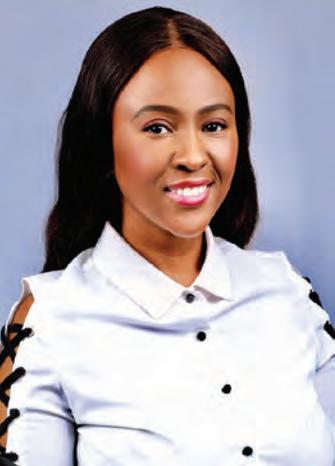
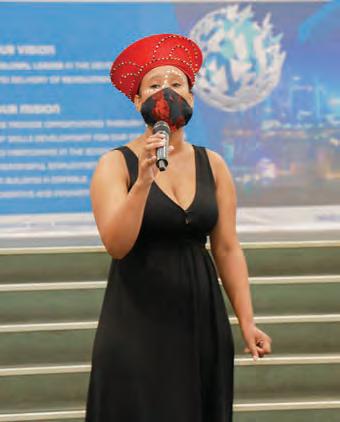

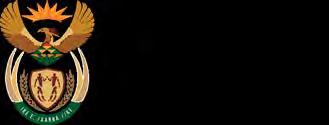



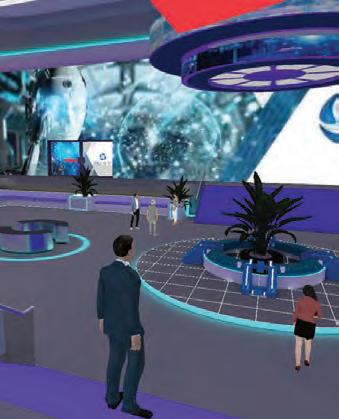

He believes that the ICT’s sector should be led by young people, because they are creative and imaginative, and have the ability to implement technology-based solutions.
The economy will be automating in various industries, and young people must gear themselves to provide innovative solutions, whether in ICT, agriculture, mining or other fields.
Developments in drones technology, big data, artificial intelligence, blockchain, and virtual and augmented reality cuts across different sectors of the economy and should therefore be monitored carefully.
Q: The MICT SETA has set its vision to be “a global leader in the development and delivery of revolutionary ICT skills”. In light of this, and subsequent to the board’s appointment until 2025, what are the Accounting Authority’s strategic priorities for the next five years?
A: First, we need to strengthen partnerships and collaborations with the industry. 4IR is a main priority where we have to be on the cutting edge to train and provide the necessary skills. We will be focusing on skills development in rural areas and marginalised communities, with a special focus on young people and women. It is also important to keep up with the market intelligence in terms of the skills that are required in the market, and so supporting SMMEs in the ICT sector is another important strategic goal. Good governance is the foundation on which these goals are anchored
Q: The Corporate Governance framework within an organisation should support organisational resilience through effective leadership and oversight. How will the new board ensure setting the right ‘tone at the top’, provide leadership and guidance, while ensuring adherence to the implementation of governance processes that promote an ethical organisation?
A: The King Code is an important compass for the Board. We have to ensure that we lead with highest possible ethics. This includes a commitment to fight against corruption and other malfeasance. However, we need to develop a culture where we do not condemn those who work and commit errors but be strong against those who deliberately act in a manner that seeks to circumvent due processes as to gain unfair access to resources. In this sense, Board members must lead by example. I do not
believe in a punitive approach to correct the wrong, unless it is as a last resort
Q: Your areas of expertise span the public sector, governance, leadership, financial management and you’re a PhD candidate. How do you see yourself harnessing these skills as the Chairperson of the MICT SETA Accounting Authority?
A: A leader is only as good as those who work with him or her. We must create a public sector that is focussed on performance and quality of service and continue to be a learning organisation – even more so in the era we are in, where changes are happening at breakneck speed. Some mistakenly interpret leadership as the imposition of fear. That is wrong. We must create an environment where management and the Board are complementing each other. That must be translated to management and the rest of the staff, and would thus creating
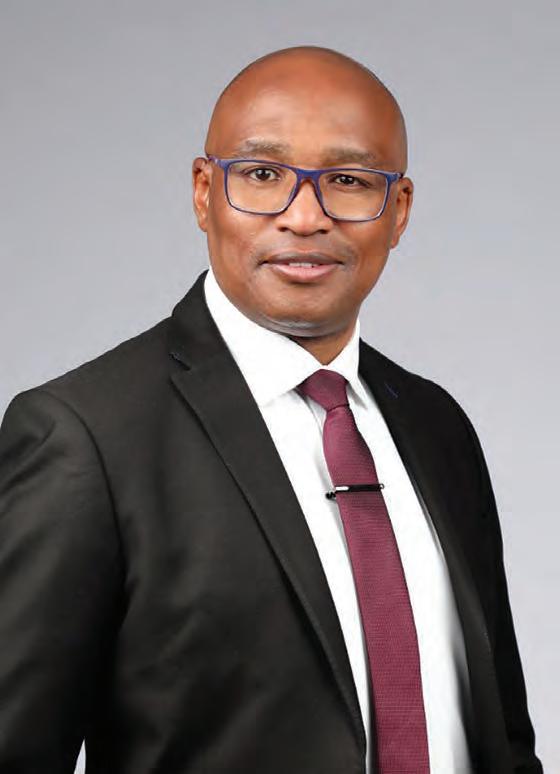
an organisation that is geared towards performance.
Q: In an effort to promote a consistent stakeholder experience, and with the onset of remote working brought about by COVID-19, has the organisation been able to respond to stakeholders’ needs; and are there interventions in place to ensure that the MICT SETA remains customer centric?
A: Yes, the “New Normal” has caused disruption in stakeholder management and engagement. This has prompted us to consider new ways of engaging our stakeholders. I strongly believe that personal contact will not easily be replaced by virtual means of interaction, but we have established new channels to engage our stakeholders. An example is that we had a very fruitful and productive engagement with some of the top 100 levy payers through virtual means. We also are in full appreciation of the fact that we have not reached a good number of our stakeholders. As such, we are going to reach out to some of our stakeholders within the limits of the COVID-19 regulations. The major challenge is how we reach out to our stakeholders in rural areas where there is limited connectivity. So, we will continue to explore options that are available to us.
Q: While the severe impact of COVID-19 on skills development and training has been evident particularly within marginalised communities, what apparent opportunities has it brought about for improving or transforming the media, information and communications technologies sector?
A: The Economic Reconstruction and Recovery Plan (ERRP) places emphasis on skills for rural areas. This presents an opportunity to reach out to the rural areas. We are currently exploring an e-learning platform that will assist us in reaching and penetrating the rural
areas amongst other measures like increasing the level of connectivity in those areas.
Q: How has COVID-19 impacted the delivery of the MICT SETA mandate; has there been any adjustment to strategic priority areas to ensure fulfilment of the annual performance plan?
A: Covid-19 has heavily impacted on MICT SETA service delivery. At first, we were hit by a loss of revenue of more than R300 million. We had to adopt some cost containment measures so as to ensure that we contain cost as the revenue was negatively impacted. This meant we had to revise our targets downwards as we did not have the necessary financial resources. That said, we have managed to perform relatively well in the context of the pandemic.
Q: SMMEs present the highest possibilities in job creation. Has the MICT SETA put in place programmes to support SMMEs in skills development, in order to enable their impactful participation in the economy?
A: It is widely acknowledged that SMMEs are the response to the challenge of creating jobs. However, there is more that has to be done to restructure the economy so that is offers conditions conducive to a thriving SMME sector. We have to be deliberate in creating and sustaining opportunities for SMMEs. Beyond the BBBEE framework, I think more must still be done to ensure that we create space and opportunities for SMMEs, from the perspective of government policy framework and spend.
Q: The Fourth Industrial Revolution (4IR) is upon us. Collaboration and alignment to an African context is key. How are you and the MICT SETA preparing South Africans, in terms of aligning qualifications and skills programmes to the critical skills that will push South Africa to be an e-skilled economy?
A: We are in a process of developing new qualifications that directly respond to the 4IR. These qualifications are developed in consultation with the industry and the necessary approving authorities. The process is not as fast as we would have hoped, but we are engaging with all stakeholders. We still have a challenge in ensuring that we respond to various sectors of the economy with different needs that must be addressed in terms of 4IR. It could be education, health, agriculture, mining, media, ICT and so on. All of these subsectors need to leapfrog to catch up with the rest of the world. Africa is seen as and operates as one monolithic economy. There are policy intentions to that effect led by the African Union. However, a lot of work in terms of creating the necessary infrastructure still lies ahead.
Q: You have served on a number of boards in diverse sectors. How do you see your expertise acquired contributing to your responsibilities at the MICT SETA and its success?
A: The role of the Board is not always properly understood –not even by those who serve on boards...but we are all prepared to learn. Serving on different Boards develops one’s ability to be a lateral thinker. In this day and age, it is critically important to be able to think laterally. I have served in various industries and committees. This has helped me to appreciate complexities of performance in different organisations. I have worked with many different people. In the process, I have learnt how to deal with various characters. Some boards collapse because of difficult personalities that have seats at the table. Some focus on their selfish egos and thus take eyes off the proverbial ball. Even though some would join organisations for selfish reasons, I have learnt that one needs to focus on what is in the interest of the organisation. There is a need to keep a very level head and calmness, while you remain firm on issues of principle.

As appointed by the Honourable Minister, Dr Blade Nzimande, the Board brings an impressive and diverse range of disciplines and a wealth of experiences and knowledge to help guide the MICT SETA in realising the development and delivery of revolutionary ICT skills. It comprises of diverse labour, community organisations and industry professionals who understand the needs of its membership and possess the energy and commitment to lead the SETA. Each member will serve a five year term.
Their robustness and commitment to strategy and performance in the sector and the SETA delivering on its mandate, through good governance is demonstrable.
The MICT SETA management is very pleased to have these outstanding industry leaders serve on our Accounting Authority. The breadth, depth, and diversity of their experience will strengthen the strategic vision of the MICT SETA. Each member has a reputation for strategic and collaborative leadership, to enable the SETA to pursue the development of a 21st century skilled workforce and to fuel inclusive and sustainable economic growth in South Africa, whilst promoting transparency and accountability at all levels in the organisation.
With these individuals at the helm, the future of young people in the ICT sector just became a lot brighter.
Mr Solomon Xaba who represented the Organised Labour Constituency in the MICT SETA Board, passed away on 13 June 2021. Mr Xaba was the National Spokesperson of the National Education, Health and Allied Workers’ Union (NEHAWU). His passing was a great loss to the MICT SETA, his community and workers in general, family and friends.
“We were fortunate to have Mr Khaya Xaba as a member of our board. He was an energetic, outstanding leader and valued colleague who advocated for the injustices towards workers. His desire to be of service to others and champion workers’ rights leaves a lasting legacy”. – Mr Simphiwe Thobela, Board Chairperson, MICT SETA.
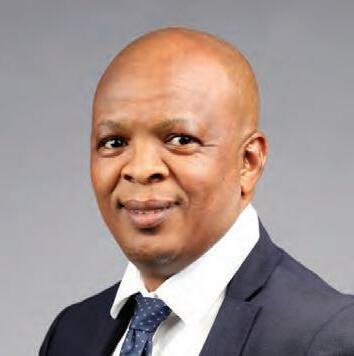
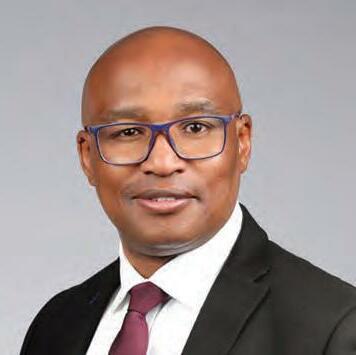
The MICT SETA Board hit the ground running since it came into effect on 1 April 2020.Mr Simphiwe Thobela (Chairperson) Constituency: Chairperson of the Accounting Authority Stakeholder represented: Ministerial Appointee Mr Viwe James (Member) Constituency: Organised Labour Stakeholder represented: National Union of Metal Workers (NUMSA)
Ms Portia Buthelezi (Member)
Constituency: Community with Interest Stakeholder represented: Ministerial Appointee
Mr Sipho Zwane (Member)
Constituency: Organised Labour Stakeholder represented: Democratic Postal and Communications Union (DEPACU)
Constituency: Organised Labour Stakeholder represented: Communication Workers Union (CWU)
Mr Lesiba Langa (Member)
Constituency: Organised Labour Stakeholder represented: South African Postal Workers Union (SAPWU)
Mr Thabo Mofokeng (Chairperson of ICT SteerCOM)
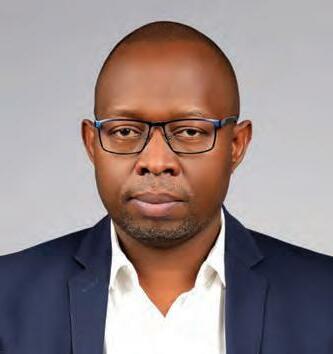
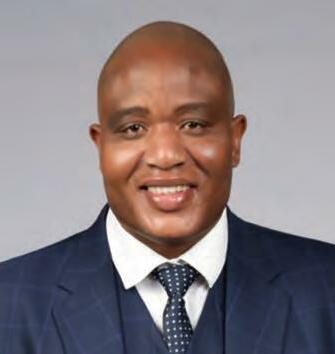
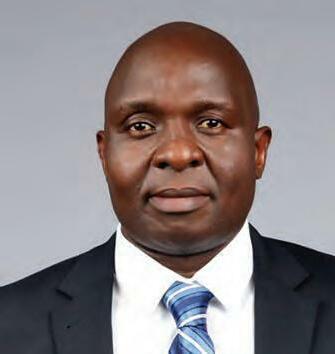
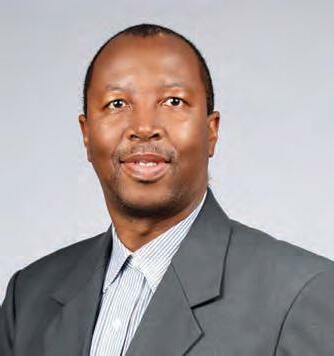
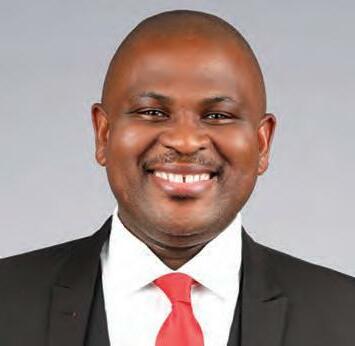
Constituency: Organised Employer Stakeholder represented: Information Technology Association (ITA)
Ms Ntombikayise Khumalo (Member)
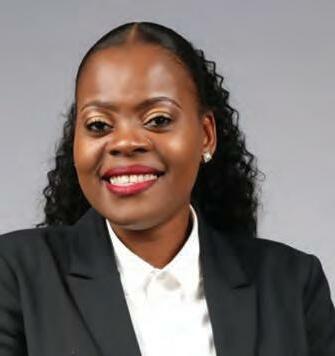

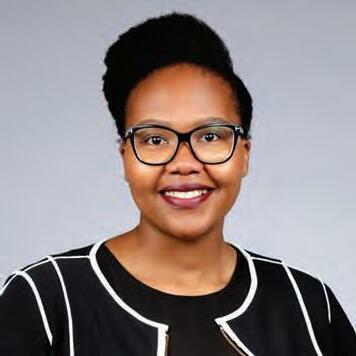
Constituency: Organised Labour Stakeholder represented: Communication Workers Union (CWU)
Ms Thabisa Faye (Member)
Constituency: Organised Employer Stakeholder represented: South African Communications Forum (SACF)
Constituency: Organised Employer Stakeholder represented: SMME ICT Chamber
The MICT SETA hosted a dynamic 4IR powered virtual capacity building workshop on career development services with its key stakeholders on 22 June 2021.
A roundtable dialogue with industry and key role players in the sector was hosted and provided meaningful insights on improving and delivering more equitable learning outcomes in post-education systems within the media, information and communication technologies sector.
Stakeholders within the media and ICT sub-sectors and the Post School Education and Training (PSET) system, as well as learners, youth, unemployed youth, and graduates participated in the capacity building workshop facilitated by KHETHA Career Development Services (CDS), learners and graduates and were exposed to available career opportunities and valuable information to equip them to make the right career decisions. Participants also analysed the impact of the new normal brought about by COVID-19 in the sector.
With the Fourth Industrial Revolution (4IR) creating a disruptive environment, and digitally transforming the way we live, study and work, the expo employed 4IR activities such as virtual reality to deliver a unique, and engaging exhibition with the theme “Skills development as an
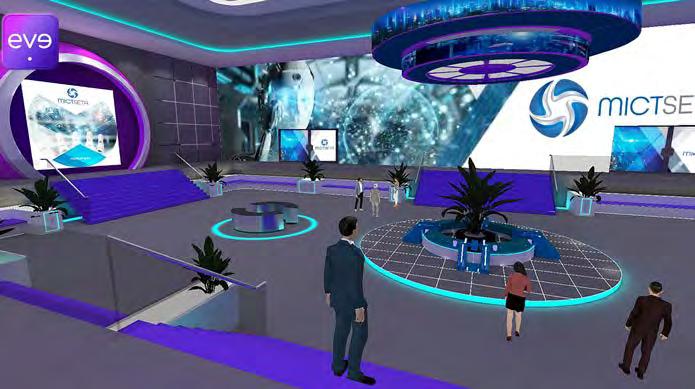
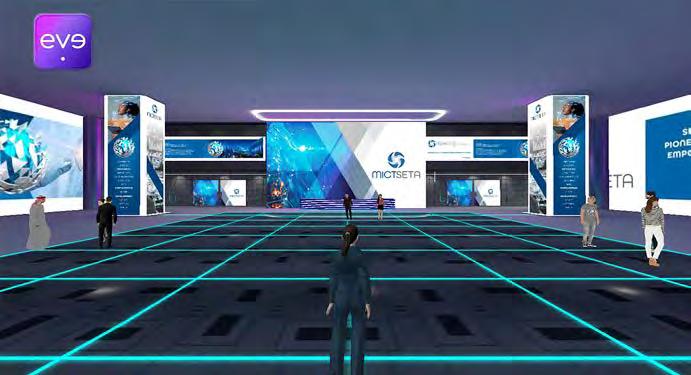
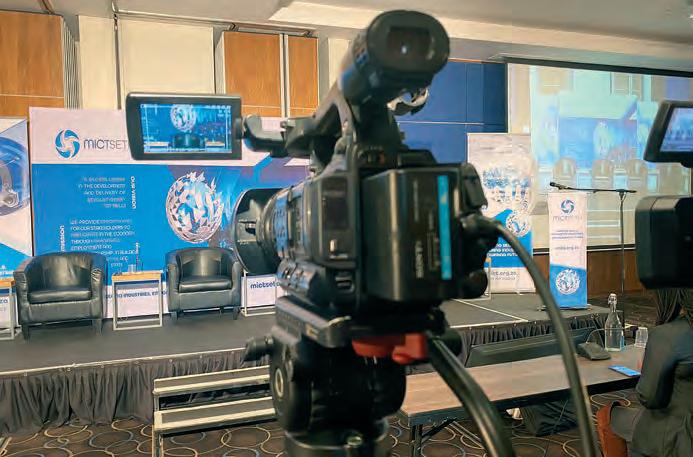
Expo harnesses the power of 4IR digital tools like virtual reality to deliver a unique and engaging experience. “The very first 4IR-driven expo in our sector”
- Mr Matome Madibana, MICT SETA Acting CEO.
enabler to economic recovery and driver of the digital economy”

“We are excited as the MICT SETA to host the very first 4IR driven expo in our sector to answer to the need of producing tech-savvy beneficiaries with the necessary skills required in the future”, MICT SETA Acting CEO Mr Matome Madibana said during the event. Madibana highlighted the importance of implementing strategic interventions in skills development that impact on today’s economy.
“The MICT SETA 3D Career Expo underscores our commitment to skills development amid the rapid change in technology and skills needs by engaging key industry partners within the sector to showcase their offerings and opportunities within the industry,” he added.
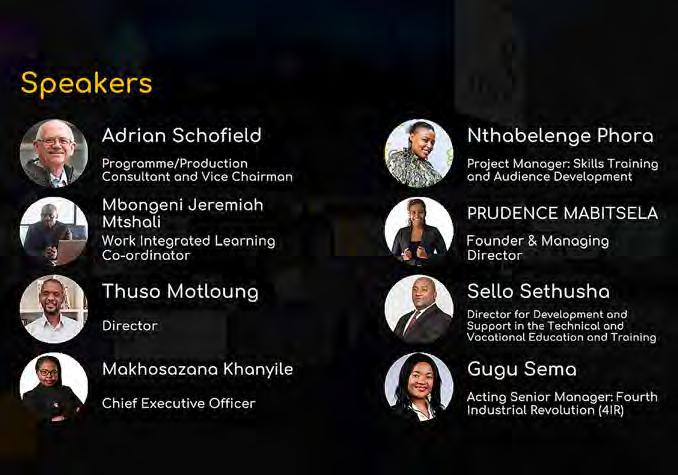
The Media Information and Communication Technology Sector Education and Training Authority (MICT SETA) is pleased to announce that it received a clean audit opinion from the Auditor-General for 2020/21. The SETA welcomes this announcement, against the backdrop of a challenging financial year due to the COVID-19 pandemic.
Congratulations to the team for their commitment to good governance!
The MICT SETA WC has partnered with the Office of the Presidency and Moja Media to run a learnership programme for 100 beneficiaries, focused in the municipalities of the Garden Route, Cape Town Metro, Saldanha Bay and Witzenberg.
Moja Media is an independent, proudly African media company that endeavours to change the prevailing western global narrative on Africa by truthfully portraying the global story.
Moja media aims to provide a disruptive media service to Southern Africa by providing opportunities and platforms for Africans to tell their own stories to continental and international audiences.
A unique feature about this small business is its ability to combine production capabilities with broadcasting. The company has organically created two TV channels, BRICS TV and Roots TV, which are both hosted by StarSat.
Moja media has partnerships with Startimes (Africa), StarSat (SA) and TeleSur (Latin America) as part of its extended platforms for continental and global reach.
In partnership with MICT SETA, Moja Media offer a multi-media training programme (learnership) in the
Western Cape Province, for the following full qualifications:
• Telecommunication Network Operations (NQF L4)
• Film & TV Productions (NQF L5)
• Radio Productions (NQF L5)
• Radio Productions (NQF L5)
The commitment of Moja Media in raising the consciousness of previously marginalised communities is unwavering in the quest to bridge the cultural and digital divide by creating platforms for expressions and skills development.
Its skills development programme started on 15 November 2020, and will run until 15 November 2021.

Induction programmes were honoured by the respective Mayors, who were Keynote Speakers, and South African Film & TV celebrities also joined in to counsel and
encourage the young participants about the importance of relevant skills in the market place.
The training programme received yet another boost when Hollywood Bets donated further training equipment in the form of cameras, lights, a drone, and laptops.
Gracing the handover was an international Hollywood actor, Hakeem Kae-Kazim.
The donation ensures that the next cohort of learners will have the appropriate training equipment.
Cape Town was brightened by film stars, directors, producers, ministers and deputy ministers, ambassadors, and political and traditional leaders, all converging on the Mother City for the One People International Film Festival on 27 April 2021.
The Film festival had three categories (Feature Films, Covid-19 Short Films & Indigenous Films). Two of feature films by Moja Media learners were nominated for the Oscar Awards, and one won two days before the official opening.
A unique feature of the film festival was the inclusion of master classes, where film directors, producers and regulatory bodies presented various topics. Learners became part of the experience, getting particularly involved in the master classes.
The importance of the film industry is well documented in its spinoffs for the Tourism and related industries. It is particularly important in the current epidemic that our country is grappling with and offers a way to kick-start the economy.
In President Cyril Ramaphosa’s SONA address early this year, the industry’s importance was
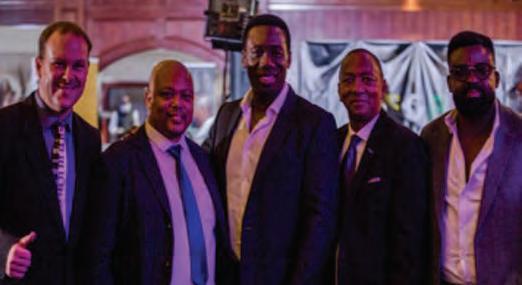
highlighted. During the same time of the President’s SONA, a learner from West Coast (Radio Production) was interviewed by the Government’s communication officials (GCIS) about the programme, their experiences and future prospects.
A news feature also aired on Telesur’s main bulletin, profiling one of the learners in the Winelands’ Film & TV learning programme. It gave international exposure to the area as well as its farming activities.
As part of gaining practical training, the learners from Winelands set up a multi-camera production at a Youth Day event in Ceres, where the learners were directed by renowned veteran Johann Abrahams (Former Executive Producer of Special Assignment at SABC).
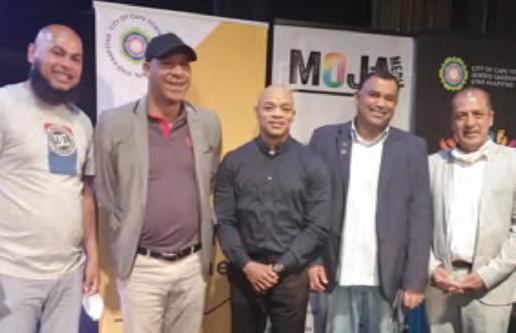
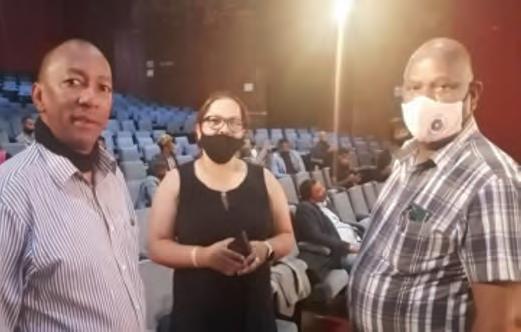
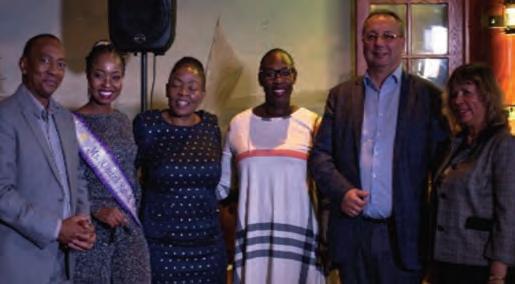
Coast are undergoing their practical training at Radio West Coast. Radio Station has embarking on a recruitment drive, and will offer prospects to some learners interested in being taken onboard once the trainingperiod has concluded.
A conscious effort is made to expose the learners and the learning programme to as wide an audience as is possible. Networking is an essential part of enhancing the employability of the learners beyond the training programme.
So far, it is of great relief that even during the challenge of the COVID-19 epidemic, Moja Media had no infections at any training sites. Learners, facilitators, and managers have maintained strict protocols as prescribed by Government and recommended by the World Health Organization (WHO).
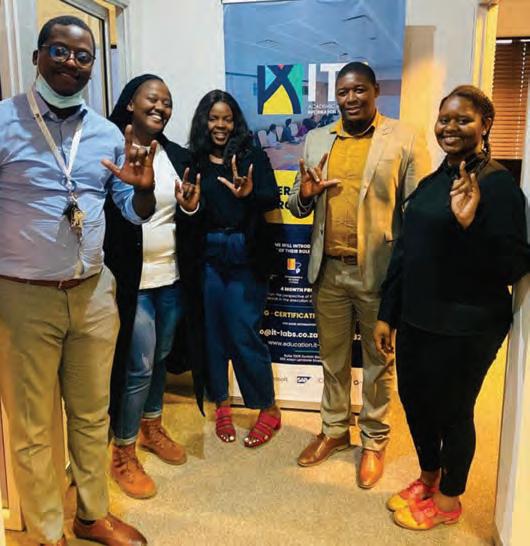
Deaf citizens of KwaZulu-Natal have historically been left out of mainstream activities of the economy, but this is starting to change thanks to a unique programme aimed at using IT as an enabler, which is funded by the MICT SETA.
Various institutions and colleges offer generic and structured training, but certainly not personalised training tailored to industry and customer needs. IT Labs was established to close this gap and provide more personalised training, to enhance productivity of workers in the workplace.
This project, in collaboration with the MICT SETA and SA Deaf Society KZN, focuses on two aspects: providing competitive technical computer skills to equip deaf citizens with skills that are in critical demand in the economy, and training sign language interpreters who can convey technological concepts and are equally tech-savvy.
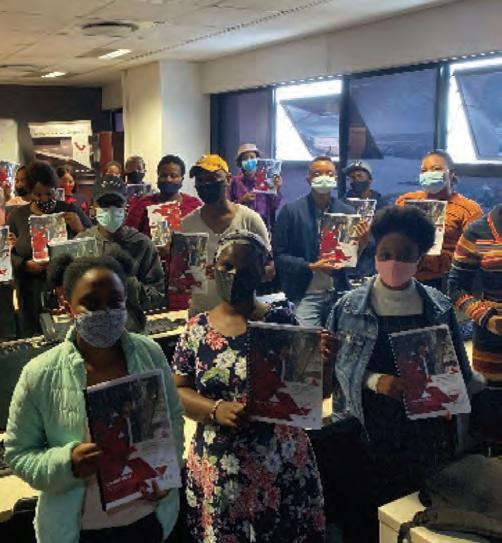
The 75 learners currently enrolled will soon have an opportunity to open and run their own computer workshops, or work at call centre back offices using chatroom applications and e-mails to communicate.
Interpreters will have opportunities to translate computer technical content and work in video call centres that enable government social services to better assist and support the deaf community.
“One day, I would like to teach this course”
– Nontsikelelo Rosemary Mellicent Dlamini, Zwelibomvu, DurbanBeneficiaryFrom Left to right: Mduduzi Mchunu (IT Labs Director), Thobeka Ntombela (Student), Mpume Bhengu (programming interpreter), Scelo Dlamini (SANDA), and Hlonishwa Nyembezi programming interpreter).
In partnership with the MICT SETA, IT Labs collaborates with the SA Deaf Society in KZN to train sign language interpreters, technicians
“I have tried many opportunities, but it has always seemed companies have no resources to accommodate the deaf.
You need to have special technical skills to be brought on board. Studying this course made me understand the importance of learning technology. The IT industry allows you to communicate using emails, chatrooms and get the work done.
I know soon I can be placed in a good company as a technician
or open my own computer maintenance company in my township.
Being part of a skills development programme has been my dream.
This programme will enable me to pass on computer skills to the deaf community and assist them in understanding that learning computer competitive skills is compulsory to have a successful career.
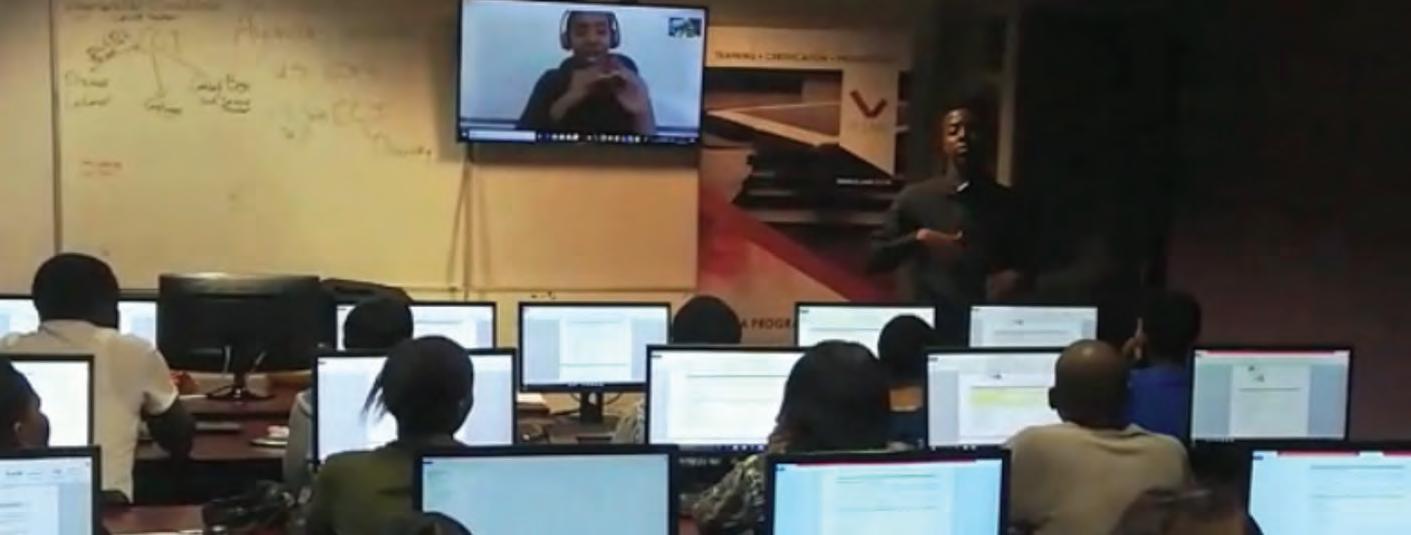
One day I would like to teach this course.”
Lenah Nawa is one of many young people who benefited from the MICT SETA funded learning programmes.

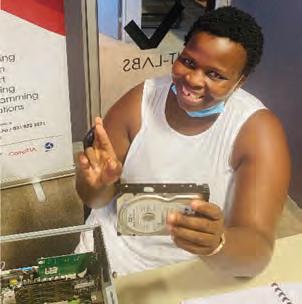
After completing her studies with FEDISA, she had the privilege to graduate and celebrate her incredible feat.
Lenah is grateful for the support provided by the MICT SETA and said: “thank you so much for the contribution you have made since the beginning of my studies.
“No words could ever describe how grateful I am for the impact that the MICT SETA has had in my life, that is,
in helping me to complete my studies”. Lenah praised the MICT SETA for the seamless process and yearn to see more lives being positively impacted.
“Going forward I wish you could touch more lives and I wish the SETA all the best in their future endeavours. Once again thank you so much”.
The MICT SETA is committed to make post-school education and training equitably accessible and offers bursaries in partnership with its stakeholders for South African citizens to pursue full-time studies within any of the fields that fall within its sectors.

The 14th Leadership Skills Development Summit was held as an online conference in June 2021, and sought to provide answers and solutions to the many challenges facing South Africa and in particular the issue of youth unemployment.
A recurrent theme among the topics discussed was the everincreasing need for investment in skills development in the face of new economic trends and skills shortages. South Africa
Which skills do we need in order to face the unexpected?
Automation and globalisation are reshaping the world economy. Within the next four years, more than 5 million jobs are expected to be lost to robots.
Emerging economies face more daunting challenges like:

• high drop-out rates
• meagre funding
• lack of access and inclusion
• acute shortages of qualified teachers
And how do we equip today’s school-age children for professions that don’t exist yet?
faces an alarming shortage of skilled workers in almost every sector, which underscores the importance of investing into skills development programmes to address these shortfalls and add much-needed capacity to our economy.
The economies of South Asia and Africa will supply nearly 60% of the world’s new workers by 2030, according to the McKinsey Global Institute. But if current education trends continue, the global labour force will contain at least a billion workers who lack the necessary education and skills.
Mr Simphiwe Thobela, Chairperson of the Board of the MICT SETA, participated in one of the panel discussions of the Leadership Skills Development Summit, on the topic of vocational and technical skills as drivers of entrepreneurship and employment. He emphasised the need for improved financial and numerical literacy skills that prospective entrepreneurs and job seekers should possess.
“One of the key things that we as a country need to address is numeracy skills,” Mr Thobela said. “Without addressing numeracy skills, we will have a problem with the supply of various other skills in the larger economy. We should definitely assess the structure of our education system and its ability to produce the numeracy skills that are needed in the economy
as it goes more and more digital.”
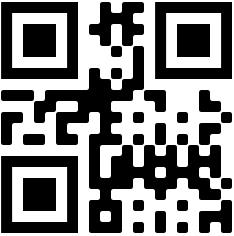
Partnerships between public and private sectors need to be forged so that new curriculums can be drawn up that match young people with the real needs of businesses, he added. The emphasis must be placed on developing skills that industry wants and needs.
“Collaboration and partnerships are important,” Mr Thobela pointed out. “All of the 4IR qualifications that we developed and approved recently, were developed in collaboration with industry. Given the pace at which things are changing, if you sit in your ivory tower and develop qualifications with the hope you’ll be responding to industry needs, by the time you get them approved, the industry has moved on. The most important thing is to keep pace with industry and that a partnership should not be accidental or incidental, it should be a thorough-going partnership.”
The partnerships between different sector education and training authorities should also be strengthened so that more can be achieved and more people can be reached. Mr Thobela cited Minister Blade Nzimande as having said that SETAs are not SETAs of Johannesburg or of Sandton, but SETAs of and for the whole country.
“One area where we’re not doing well as a country is that SETA’s and programmes are not reaching youth in all geographical locations,” he noted.
Going forward, the MICT SETA intends broadening its reach and gaining better understanding of the needs of outlying geographical areas, their industry and their communities.
The other panellists at the event were Yershen Pillay of the Chieta, Abraham Oliver of False Bay College and Giselle McIntyre of Nemtek. These panellists agreed that there is a need for development within a framework of inclusivity and development that is transformative.
Gender gaps persist globally in women’s access to skills development and participation in the labour market. The main challenges women face include gender biases in occupational choices, barriers to education and training (especially in rural and informal economies), sociocultural and economic constraints – and low representation of women in STEM subjects.
The issues raised in this summit are relevant not only in South Africa, but across the globe, which is why the Leadership Skills Development Summit is an event not to be missed.
In celebration of Youth Month, the MICT SETA participated in the Digital Youth Festival (DYF), an initiative by Africa Beyond 4IR (AB4IR). It was conceptualised with the intention to create a platform to expose the youth of South Africa (particularly those based in under-resourced communities) to the opportunities available in the digital creative industries world. The inaugural festival was hosted in three provinces (Gauteng: 10-11 June, Limpopo: 17-18 June, and Eastern Cape: 24-25 June 2021) as a hybrid (physical and virtual) event to accommodate more participants than the venues permit and to adhere to COVID-19 regulations observing.
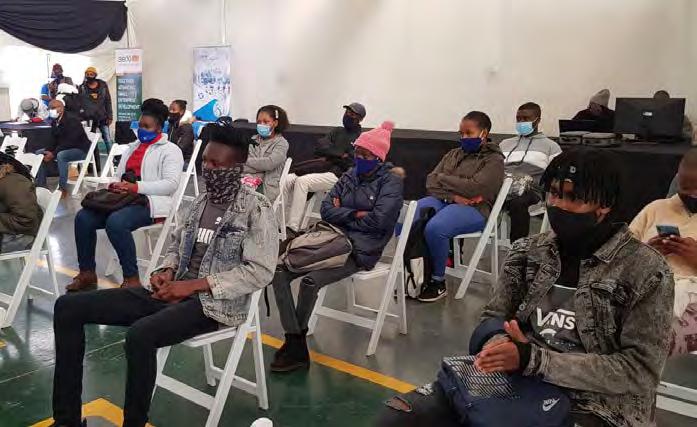
The festival was twofold; career expo and the panel discussion. The panel discussion addressed topics such as:
• Digital transformation plans for township revitalization;
• Funding and market access opportunities;
• Future jobs and required skills;
• Gaming, animation, and VR opportunities;
• Using innovative solutions to solve community challenges and;
• Decoding the 4IR and highlighting the trends
Our Acting Senior Manager: 4IR, Ms Gugu Sema participated in a panel discussion under the theme: “Future Jobs and Skills Required”, where she unpacked the opportunities that exist in the MICT sector.
The plan for 2022 and beyond is to roll out the festival, nationally, as a roadshow during the month of June, in line with a commemoration for Youth Month in South Africa.

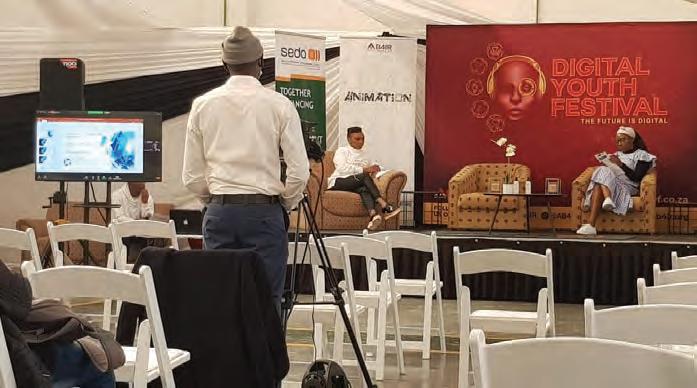
Analysts and company executives generally all agree that all companies must transform digitally to remain competitive.
However, determining what digital transformation means for any given organisation, laying out a roadmap to get there, and then achieving a meaningful level of transformation, is no mean feat.
The most challenging aspect of digital transformation isn’t necessarily the technology: It’s effectively managing change and getting people to embrace it.
In this time of technological disruption, it is an undeniable fact that organisations must be equipped with the necessary digital and management skills to adapt and innovate.
Large and small organisations are being disrupted by more agile, digitalcentric, customer-focused competitors who are attacking so-called cash cows and creating completely new product categories.
The Digital Transformation Forum hosted a virtual event in June 2021,

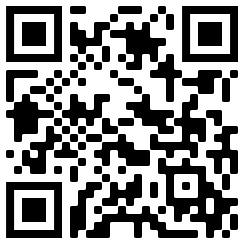
which covered how technologies like Artificial intelligence (AI), the Internet Of Things (IoT), Analytics, Blockchain, Machine Learning, Cloud and Edge Computing could offer immense opportunities for companies to develop resilient business models.
It examined how to enact resilient, long-term, cloud-based digital infrastructures that drive the future of work, connected digital experiences, and digital innovation strategies.
MICT SETA Chief Information Officer, Mr Moloti Nkune, took part in a panel discussion on the topic of Digital Enterprise Technology Leaders.
He confirmed that work was already underway at the Sector Education and Training Authority to respond to the massive technological shift currently being experienced in the workplace.
“The MICT SETA is in the process of ensuring that these 4IR skills that are required are developed,” Mr Nkune said during the discussion. “This will enable us to then be able to train on artificial intelligence, the Internet of Things, 3D Printing, Big data and Robotics.”
“ It is time to ensure that the [digital] skills sets are embedded into the models of traditional training and development in order for us to remain relevant in the 4IR space.”
- Mr Moloti Nkune, MICT SETA Chief Information OfficerThe
MICT SETA CIO confirms readiness for incorporating 4IR-related skills at event held as virtual conference

The Heritage Careers Expo acts as a platform to showcase and celebrate the vast wealth of South African Heritage. This initiative is led by the Department of Higher Education, Science and Innovation, and endorsed by Honourable Deputy Minister, Buti Manamela in partnership with strategic partners in the Post Education and Training sector, SETAs and the like.
The objective is to showcase, promote and influence youth to consider careers in the heritage sector and is celebrated under the theme “Unlocking the Wealth of our Heritage”. The expo was also aimed at:
• Creating awareness about the wealth within the Heritage Sector;
• Exposing learners to vast career opportunities that exist in the Arts, Culture and Heritage sectors;
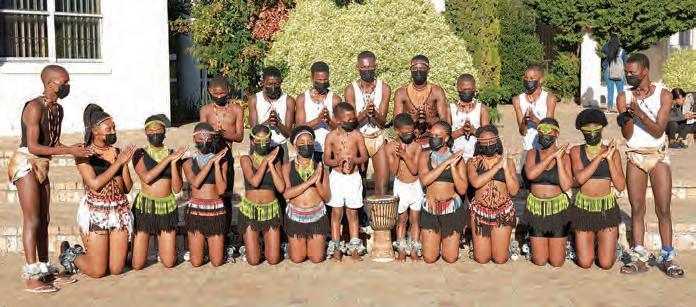
• Exposing learners on how to capture history as it happens for future generations using today’s technology devices and how Science and Technology is a catalyst in conserving our indigenous languages, culture, cave art, oral history, maintenance of the ecosystem and reading of fossils, etc. and
• Promoting and influencing youth to consider careers in the heritage sector such as Media and, Broadcasting.
The Expo was a month-long activation comprising of small events, online

streamed content, masterclasses, roundtables and behind the scenes content that was recorded and shared with the learners via various digital platforms.
The opening ceremony was held at the Mapungubwe National Park, Musina in Limpopo on 6 May 2021 in partnership with Vhembe TVET College as the main support in the province and other PSET institutions supported the department. The closing ceremony then took place at


the College of Cape Town, Crawford Campus, Western Cape province on 8 June 2021.
Our stakeholders in the Film and Television and ICT; Bolobathaba Media Group, Cardova, Visual Impact and Universe Direct showcased their offerings to the young people interested to enter into the industry and have a better knowledge on how they can use Media and ICT to preserve their heritage.
The MICT SETA played a key role in hosting a first-of-its-kind opportunity to bring communities and leaders together in a webinar to explore how we can survive and thrive in the throes of the Fourth Industrial Revolution.
Marshall Nelson, MD of The Youth Media Movement – recently recognised as an Institute of Occupational and Sectoral Excellence by the MICT SETA – worked with Cikizwa Roto, MICT SETA’s Regional Manager, and SEDA, as co-sponsors of the webinar, which took place on 15 June 2021.

The aim of the event was to inform the public, businesses and educators about opportunities that exist, and to provide exposure to the work done by agencies to help communities identify and upskill themselves in 4IR specific areas (based on annually researched, identified and published skills gaps).
A diverse and committed group of National, Provincial and local leaders and high-profile partners – all experts in top management positions and various aspects of 4IR -– contributed to this important conversation, sharing their visions and practical ideas of how we can build digital– and 4IR–ready communities.
What was originally envisaged to be a two-day celebration, especially for the youth (with onsite speakers on 15 June and June 16th Youth Day direct engagement with 3D printers, drones and other hi-tech machinery) had to be converted into a webinar, which was hosted at the Sky Hotel/Robot Hotel in the CBD by the YMM and Webrora.
With Marshall Nelson (of YMM) and Warren Manuel (of Webrora) cohosting the full morning programme in a lively and engaging manner, the participants found the sessions eye-opening, pertinent, realistic
and inspiring (see sidebar for some feedback from the event).
• An introductory taste of what 4IR is about and how important leaders are committed to supporting local access to training and business opportunities
• Creating a 4IR Community by getting the youth, educators, parents and businesses excited about their futures, and showing how they can access opportunities locally
• Recognising that it is a journey from learning to earning in this exciting new digital landscape
• Understanding and accessing the Internet of Things (IoT) and digital enablers
• The key role that local, provincial and national government agencies play in the development of skills in digital and 4IR-related industries
• Exploring the practical, ahead-ofthe-pack approach by the MICT SETA ISOE, YMM of Mitchell’s Plain as a case study
• Inviting communities to become active players in the digital and 4IR world, as key learners and earners to grow the Western Cape and national economies.
Educators, learners, entrepreneurs, small enterprises and interested community members who would like to participate in the next session on Building our 4IR Community (on 9 August 2021), or purchasing Thapelo Sekwena’s book on 4IR, can contact admin@ymm.org.za.
• Cikizwa Roto
National 4IR Government Agency
Regional Manager of MICT SETA (Western Cape)
• Prof Jean Grelying
• Nhlanhla Thlapo
Computing Sciene Department, Nelson Mandela University
Project Manager at CoLab for Digital Inclusion (University of the Western Cape)
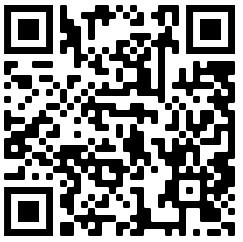
• Thapelo Sekwana – Award-winning developer, entrepreneur and author
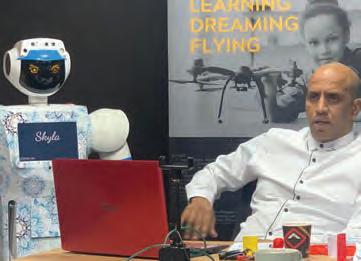
• “Very interesting and informative; thank you, Premier.”
• “It’s very interesting to learn how the WC Leadership is so focused to make a change to empower its youth and educators through various programmes and partnerships.”
• “According to the UN, digital connectivity should be a human right. I’m SO happy that CAT will be a compulsory subject.”
• “Looking forward to the next session already!”
What some attendees had to say about the webinar• Alan Winde – Premier of the Western Cape • Brent Walters – New Superintendent-General of Education of the Western Cape • Granville Stander – Director of the Metro South Education District • Dr Ntsibane Ntlaplapa – National 4IR Government Agency • Safraan Abdool

Vodacom celebrated the achievements of 146 youth, including 89 women, who graduated with certified ICT certificates from the mobile operator’s Youth Academy programme at a virtual graduation ceremony held in April this year.
The graduates spent 12 demanding months training through the Vodacom Youth Academy, whose sole purpose is empowering unemployed youth from impoverished backgrounds with ICT skills.
Trainees in the programme, established in partnership with Cisco, MICT SETA and the Department of Basic Education, receive accredited ICT training with the potential for the beneficiaries to be offered internships and real workplace experience. A work skills programme, which focuses on re-training unemployed Youth Academy alumni, has also been introduced.
South Africa has suffered from persistently high levels of unemployment. According to
DID YOU KNOW?
2020 data from StatsSA, youth unemployment in South Africa currently stands at 59%, and the country continues to experience a shortage of skills in the ICT field. Finding innovative and inclusive ways to bridge the digital skills gap has now become a priority for job seekers and employers alike.
Empowering South Africa’s youth with transferable digital skills has been proven to not only improve their employment prospects, but will also stimulate the labour market as a whole, increasing productivity, fostering innovation and promoting economic growth, Vodacom South Africa’s External Affairs Director, Takalani Netshitenzhe, said.
“Urgent action is needed to help young people develop their digital skills and access learning and employment opportunities, which is why equipping youth with the skills to thrive in the digital economy is one of our highest priorities,” Netshitenzhe explained.
“Without inclusive and equitable quality education and lifelong
opportunities for all, South Africa will not succeed in achieving gender equality and breaking the cycle of poverty that is leaving millions of children, youth and adults behind,” she said during the online ceremony, which was recorded and can be watched again by scanning the QR code below.
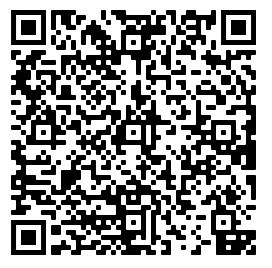
•
Vodacom’s Youth Academy programme, in partnership with the MICT SETA, is designed to inspire graduates to use the ICT skills they’ve acquired to improve their lives through furthering their education, looking for entrepreneurial opportunities or seeking employment.
• To date, the programme has trained 1 479 unemployed youth. Vodacom has committed to train another 1 750 young people by 2025.
• The training is offered free of charge but is valued at over R100 000. Students also receive a stipend.
Vodacom already zero-rates public platforms for schools and universities, with its free services reaching over 1.2 million users through its e-learning platform, and connecting over 3,000 schools across South Africa.


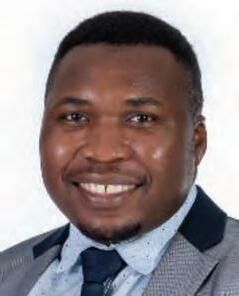
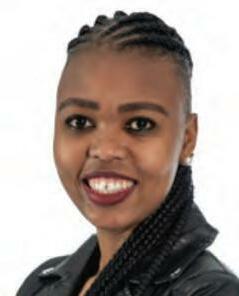
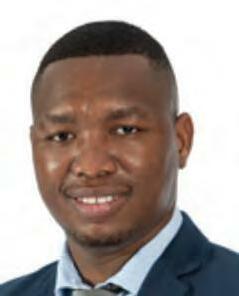
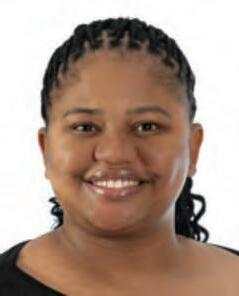
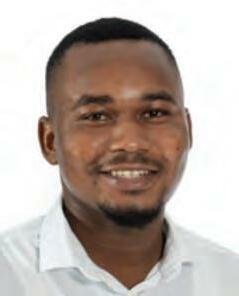
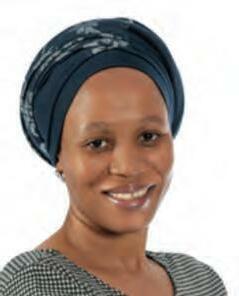

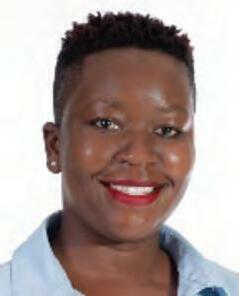

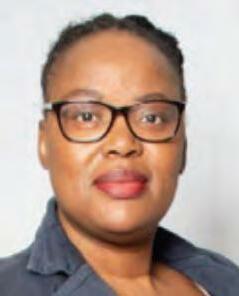
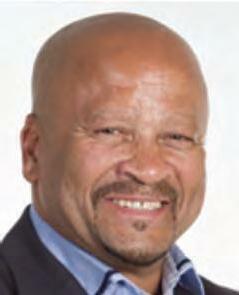
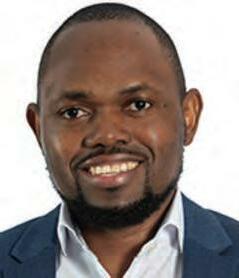
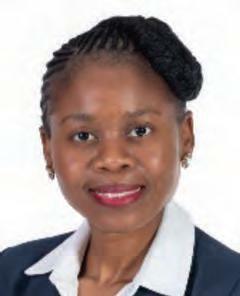
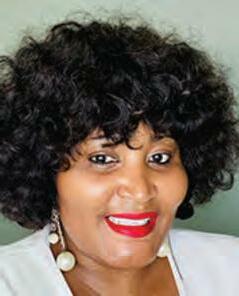
The 4IR Division under the leadership of Ms Gugu Sema has been working with Tshwane University of Technology, Wits University, the University of Johannesburg, Nelson Mandela University and the University of Western Cape to establish research chairs in an effort to facilitate research on the drivers of change for 4IR.
The MICT SETA is proud to announce its commitment to support a total of 72 students to pursue their Masters and Doctoral Degrees in the 4IR research space.
Luci Abrahams of LINK Centre, Wits University said: “We wish to express our sincere appreciation to the MICT SETA for the five student bursaries for MA by dissertation and PhD students.”
Since the inception of the 4IR division within the MICT SETA, a
number of 4IR related qualifications have been developed that will allow Skills Development Providers (SDPs), TVET Colleges and Universities to train learners on future skills:
• Artificial Intelligence
• Cyber Security
• Cloud Computing
• Data Science
• Software Development
• Internet of things

• Robotic Processing Automation
• Design Thinking
• Quality Engineering Automation
• e-Waste
The MICT SETA has further received approval of three more 4IR related qualifications (Drone Technician and Pilot, Mobile Repairs Devices and Optic Fibre) that were submitted to the Quality Council for Trades and Occupations (QCTO) for development.
“We are so proud to be part of the success of our beneficiaries. As a SETA we are not only delivering on our mandate but also making a difference in these young people’s careers,” says Ms Gugu Sema, head of the 4IR Division at the MICT SETA.
As a SETA we are not only delivering on our mandate but also making a difference in these young people’s careers.”
“We are so proud to be part of the success of our beneficiaries.
– Ms Gugu Sema, MICT SETA

Discretionary Grant applications submitted in February, March, and April 2021 windows are still under review
The SETA received a high volume of applications and we would like to assure you that we will provide feedback to all the stakeholders on
the outcomes of their application(s) upon finalising all the internal processes (document verifications and evaluations).
Workplace SKills Plans and Annual Training Reports (WSPs/ATRs) for FY 2021/2022
We would like to thank all the stakeholders that submitted their Workplace Skills Plans and Annual Training Reports timeously.
Alongside is the summary of companies that have submitted per sub-sector:
Calling all stakeholders to share career opportunities
Your contribution helps the MICT SETA propel the careers of young people
Please direct all Discretionary Grant related queries to dgqueries@mict.org.za
Calling all stakeholders to share career opportunities in the media and ICT related sectors on the MICT SETA platforms!
Send graduate programme opportunities, internships, learnerships, skills programmes, and Work Integrated Learning programmes to info@mict.org.za and help us give more young people access to opportunities.
MICT SETA offices will be open to stakeholders by appointment only during the COVID-19 Level 2 National Lockdown. In order to remain productive and ensure the safety of all stakeholders and staff during this period, the MICT SETA staff will continue to work remotely until the lockdown is lifted.
The MICT SETA has further put in place alternative measures to ease the stress and provide support to all stakeholders by also providing designated email addresses and other online platforms such as our Twitter and LinkedIn pages.

The MICT SETA believes that promoted content can play a big role in providing a stepping stone for learners, students and the youth to access the necessary information on the learning programme opportunities in our sector. The SETA gains no profit from stakeholders’ advertisements.
This disclaimer informs readers that the views expressed in the following featured content on page 25-26 belongs solely to the represented company/organisation and do not necessarily reflect the views of the MICT SETA. The MICT SETA accepts no responsibility for any errors in the advert.
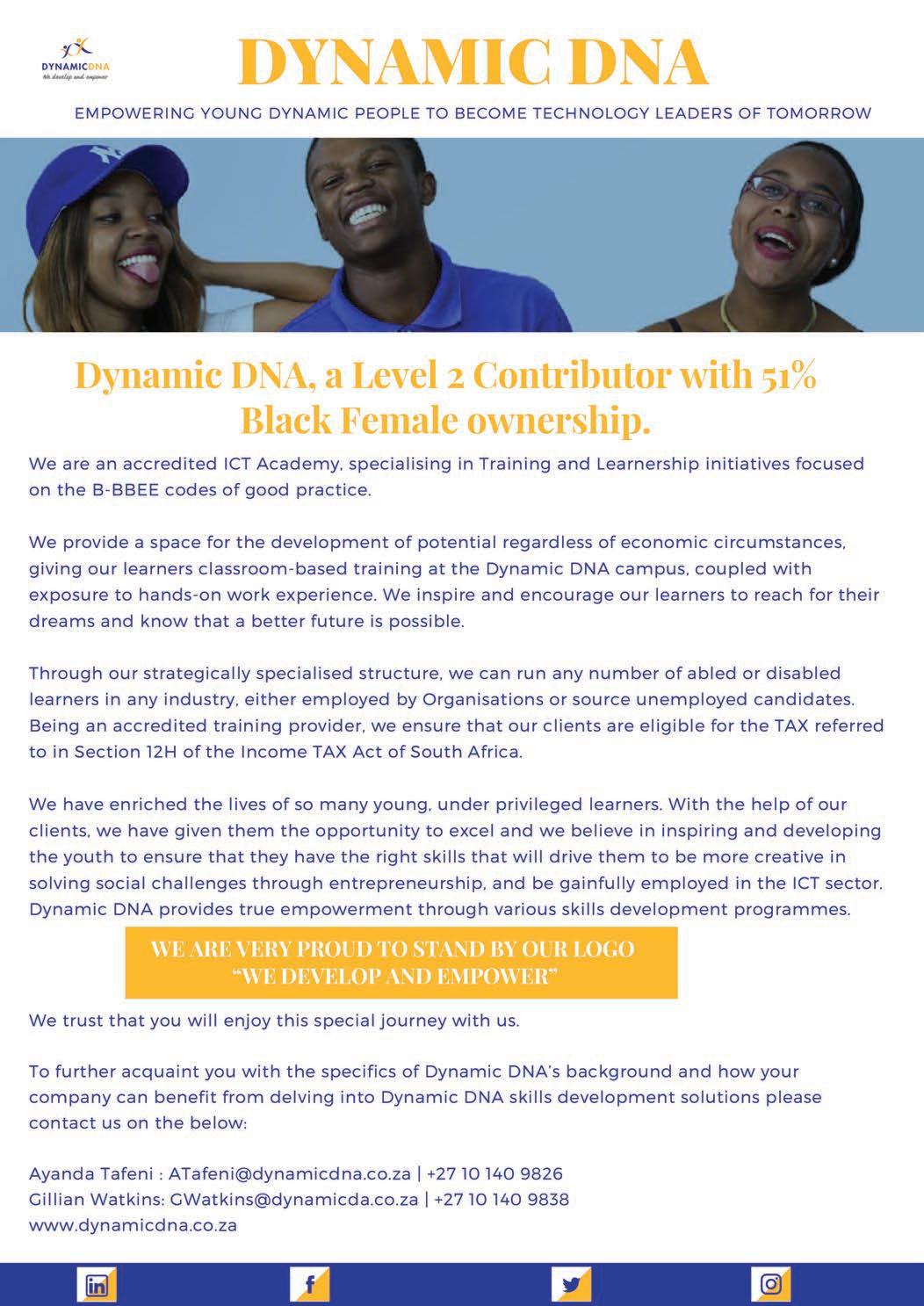
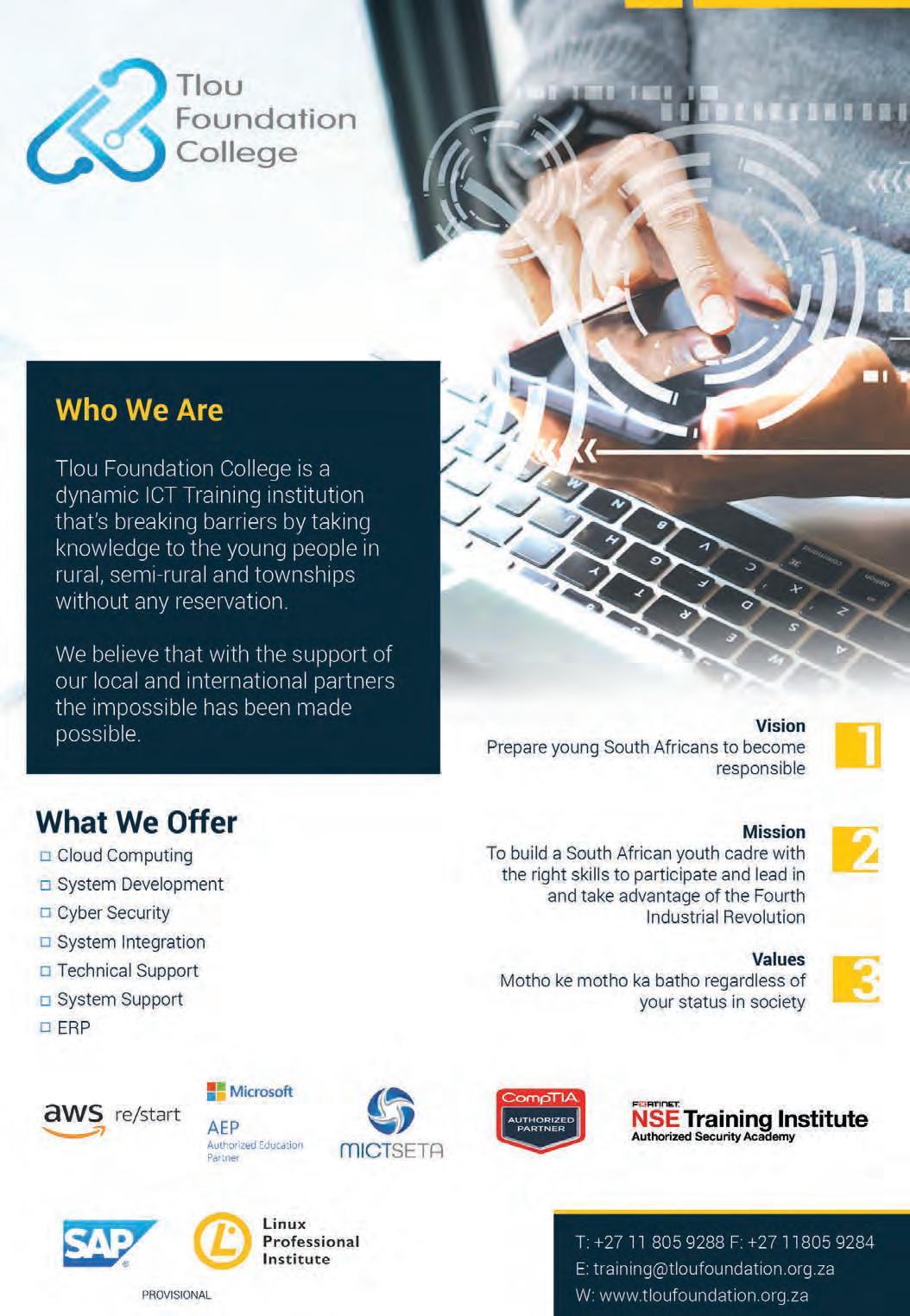
Apart from the obvious and, often very painful, physical effects of the coronavirus, the pandemic is also inducing a considerable degree of fear, worry and concern in the population at large and among certain groups in particular, such as older adults, care providers and people with underlying health conditions.

According to the Department of Health (DOH) - “The prolonged effects of lockdown on psychosocial support services resulted in the outbursts of uncertainties, acute panic, fear, depression, obsessive behaviours, social unrests, stigmatization, anxiety, increased gender-based violence cases and discrimination in the distribution of relief food aid.”
Fear, worry, and stress are normal responses to perceived or real threats, and at times when we are faced with uncertainty or the unknown. So, it is normal and understandable that people are experiencing fear in the context of the COVID-19 pandemic1. Added to the fear of contracting the virus, many of us are facing challenges that can be stressful, overwhelming and cause strong emotions in adults and children. Public health actions, such as social distancing are necessary to reduce the spread of COVID-19, but they can make us feel isolated and lonely and can increase stress and anxiety. Learning to cope with stress in a healthy way will make you, the people you care about and those around you become more resilient.
Stress can cause the following2:
• Feelings of fear, anger, sadness, worry, numbness, or frustration;
• Changes in appetite, energy, desires, and interests;
• Difficulty concentrating and making decisions;
• Difficulty sleeping or nightmares;
• Physical reactions, such as headaches, body pains, stomach problems, and skin rashes;
• Worsening of chronic health problems;
• Worsening of mental health conditions and;
• Increased use of tobacco, alcohol and other substances
During times of social distancing, it is especially important to stay connected with your friends and family. Helping others cope with stress through warm, comforting social support by phone calls, video chats, or text can help you and your loved ones feel less lonely or isolated.
Also, try to limit COVID-19 media exposure to no more than twice a day3 (e.g., checking for updates in the morning and before dinner) and try to avoid reading about COVID-19 before bedtime. An excess of news and visual images about a traumatic event can create symptoms of post-traumatic stress disorder and poor health years later. The media often creates an exaggerated impression of global panic so, take a vow to not forward (and thus propagate) alarming (especially
“fake news”) headlines to friends and family.
Mental health problems are common and are being exasperated by the pandemic. Here are some ways (apart from what should now be perfunctory; masking, sanitising and social distancing) that will help you, others and your community manage stress:
Limit your exposure to COVID-19; Pause. Breathe. Reflect; Connect with family friends through social media or a phone call;
Limit your exposure to COVID-19 related media; Keep to a healthy routine; Eat well and healthily; Be kind to yourself and others, and;
Reach out for help if you need it.
These are very trying times for all of us, for humanity as a whole. We wish you to be safe, in good health and in as positive state of mind as possible. Remember, we are all in this together and that this storm too shall pass.
1. https://www.who.int/teams/ mental-health-and-substanceuse/covid-19
2. https://www.cdc.gov/ coronavirus/2019-ncov/daily-lifecoping/managing-stress-anxiety. html
3. https://psychiatry.ucsf.edu/ copingresources/covid19

